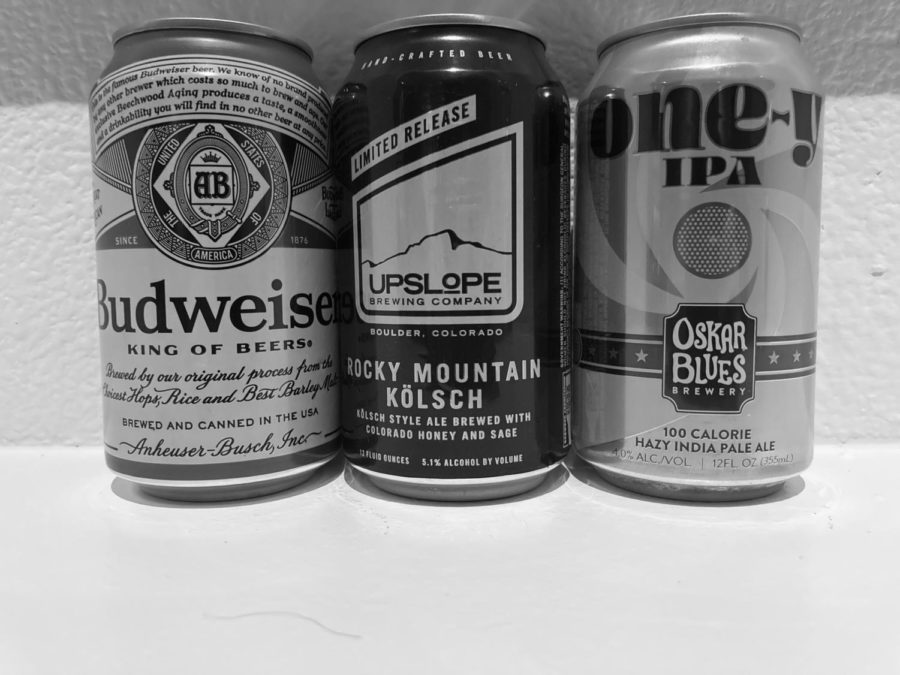Teenage Drinking: Driving Forces
The most popular alcohol, according to students, is beer.
Going to any high school party there is a high chance of alcohol being on the table, so it’s no surprise that many teenagers have indulged in drinking. After talking to students around Boulder High, most students seemed to consume alcohol due to being curious about the effects it has, Boulder having a “cultural norm” around alcohol, helping with social interaction and escapism. However, while most teenagers have ingested alcohol, this article highlights the reasoning behind consumption, and that individuals stay safe when they are intoxicated, rather than a critique on the teenage consumption of alcohol.
Peer pressure is often perceived as the leading reason for teenage drinking, however, students at Boulder High felt that this isn’t a driving factor. Numerous students felt that their drinking was because of “the feeling that I should.” Given that teenage drinking is the cultural norm at parties (or the imagined cultural norm), it’s no surprise that the National Center for Biotechnology Information states that, “crowd membership has been associated with alcohol consumption.” This means that many feel that they should partake, not that they have to. Still, the thought that being at a party with everyone being sober is “almost unimaginable” to students.
The most frequent response to the question “why did you start drinking?” was based around the general curiosity of the feeling of being drunk. Assistant Principal Mrs. Lewis claims that, “the teenage years are naturally ones of curiosity, rebellion, and a yearning for independence.” According to ParentAndTeen.com, it is because “rapid brain growth during adolescence results in even greater potential benefits to memory and learning.” Young adults are learning how to make critical decisions, which stimulates the brain and eventually the person to try new things. This urge for teenagers to try new things leads to the curiosity of feeling what being intoxicated is like.
Being at Boulder High, right down the hill from CU, and living in a college town, according to various interviews, does not contribute to the rate of consumption of alcohol amongst teenagers. However, it does affect the accessibility of alcohol, given that the college students are able to purchase the alcohol for the teenager. While being in a college town affects the accessibility of alcohol, it has little to no effect on the reason to begin or continue drinking.
Another reason for trying drinking was the idea of escapism- where a person feels the need to get out of the reality they are in. This can be because of stress caused by familial issues, school, or even friends; although this is a relatively rare case among the interviewed students.
Studies have shown social media has a major impact on underage drinking; however, Boulder High students did not realize the impact social media has. When brought up in various interviews, many responses included an “ohhhh” or “I didn’t think about that.” Social media plays a huge role in teenagers trying alcohol, since social media apps such as TikTok and Instagram also can promote the idea of drinking (by, for example, displaying new drinking games). Other media can convey this too, which relates back to the fact that teenagers are more curious than many other generations, and these posts could do no less but stimulate them.
Many students at Boulder High do not perceive drinking as the consumption of alcohol but rather a normality for social events. Students said it makes them feel “more comfortable with their surroundings,” and that it’s “[a] fun confidence booster.” According to the Gateway Foundation, alcohol causes our brain to release a flood of dopamine, the chemical associated with pleasure and making you feel more confident and powerful. Most students found they did not drink for the sake of getting drunk, but rather to have fun and feel the dopamine rush.
Drinking is neither good nor bad, rather, it is an intricate part of our society; therefore, finding the driving forces behind alcohol consumption can offer insight into young adults’ habits. In this day and age, teenagers have increased accessibility of obtaining alcohol, as well as the overall curiosity and yearning for independence. This creates a high probability that teenagers will drink. The most important thing for young adults is to stay safe and try to drink responsibly.

Calvin Boykoff is a senior at Boulder High, entering his third year as a member of The Owl. This year, however, Calvin is entering into a leadership position and has taken upthe role of sports editor. Aside from writing and editing The Owl, Calvin enjoys video production and editing, which he sees as a career path he would like to pursue. He sees his future outside of the United States and is looking toward university in the United Kingdom or the Netherlands. In addition to his interest in media and video work, Calvin is a diehard soccer fan, playing for the varsity team this fall and supporting Chelsea Football Club. After every game or practice, Calvin loves to chow down on just about any food...


